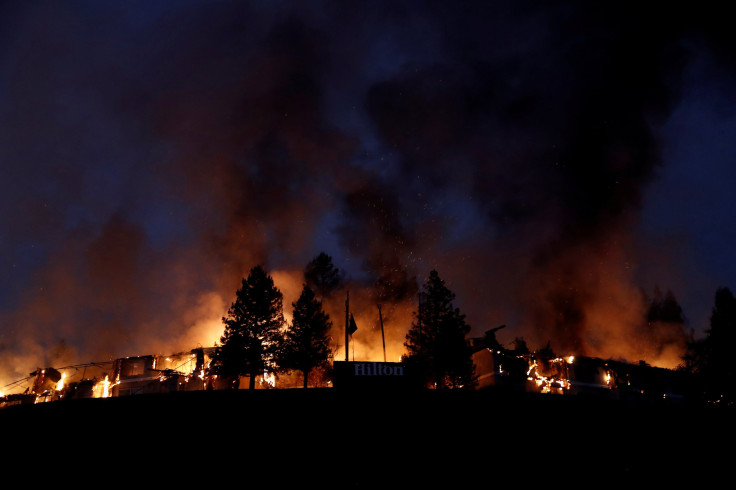California Wildfires Leave Air Quality Unhealthy, Health Measures To Follow

Multiple wildfires in California have spread to around 170,000 acres statewide, and residents living even 100 miles away from the affected areas are concerned about the air they are breathing, which mostly contains particles of dust, ash and soot, reports said.
People residing dozens of miles from the fire zone, including San Francisco and San Jose, have complained about the smell of smoke since the fires started Sunday night, CBS SF Bay Areareported.
In the San Francisco Bay area, air quality has deteriorated to such an extent that it has started affecting residents, prompting medical calls to local schools and compelling people to wear protective masks.
San Francisco officials said that hospitals have already started receiving patients for respiratory issues that are likely related to the smoke from the wildfires, San Francisco Chronicle reported.
A health advisory was issued Wednesday by the Bay Area Air Quality Management District: "Due to active wildfires and changing wind patterns, air quality could be impacted for many days to come. Outside of the active fire areas, air quality will be variable and unpredictable. Air quality may improve at times or get worse, very quickly."
The advisory also cautioned the Bay Area residents, especially in the Napa and Sonoma counties, to protect their health. Residents affected by heavy smoke must seek shelter in buildings with filtered air or move to areas outside the region which has been affected by wildfire smoke.
Residents were advised not to venture for any outdoor activity, including exercise, if they encountered smoke in their immediate area. Parents and school administrators must check air quality readings before letting children practice outdoor sports while air quality is unhealthy.
As air quality in parts of the Bay Area has become too unhealthy, residents should avoid air polluting activities like wood burning, lawn mowing and leaf blowing, driving, and barbecuing.
As of Wednesday afternoon, the Air Quality (AQI) described San Francisco air as "unhealthy for sensitive groups" as shown through the orange parts of the map. It also predicted "unhealthy" for Thursday as well.
See our meteorologists' current air quality summary for more info on impacts from #NorthBayFires: pic.twitter.com/W8nSDsTlMz
— Bay Area Air Quality (@AirDistrict) October 11, 2017
The following spots in San Francisco will provide you with filtered air.
a) San Francisco Main Library, 100 Larkin, 9 a.m. to 8 p.m.
b) Chinatown Branch Library, 1135 Powell, 10 a.m. to 9 p.m.
c) Mission Bay Branch Library, 960 Fourth Street, 10 a.m. to 6 p.m.
d) Glen Park Branch Library, 2825 Diamond, 10 a.m. to 6 p.m.
Here's a look at GOES-16 (non-operational) visible satellite imagery showing smoke plumes from fires near San Francisco, CA. pic.twitter.com/0543woQ7JW
— NWS Weather Prediction Center (@NWSWPC) October 11, 2017
Wildfire smoke can be dangerous to our health and even those who are healthy can get sick if there is enough smoke in the air.
According to Centers for Disease Control and Prevention, inhaling smoke can have immediate health effects, including:
1) Coughing
2) Trouble breathing normally
3) Stinging eyes
4) A scratchy throat
5) Runny nose
6) Irritated sinuses
7) Wheezing and shortness of breath
8) Chest pain
9) Headaches
10) An asthma attack
11) Tiredness
12) Fast heartbeat
Older adults, pregnant women, children, and people with preexisting respiratory and heart conditions should take proper care of their health as they might get sick if they breathe in wildfire smoke.
© Copyright IBTimes 2024. All rights reserved.












